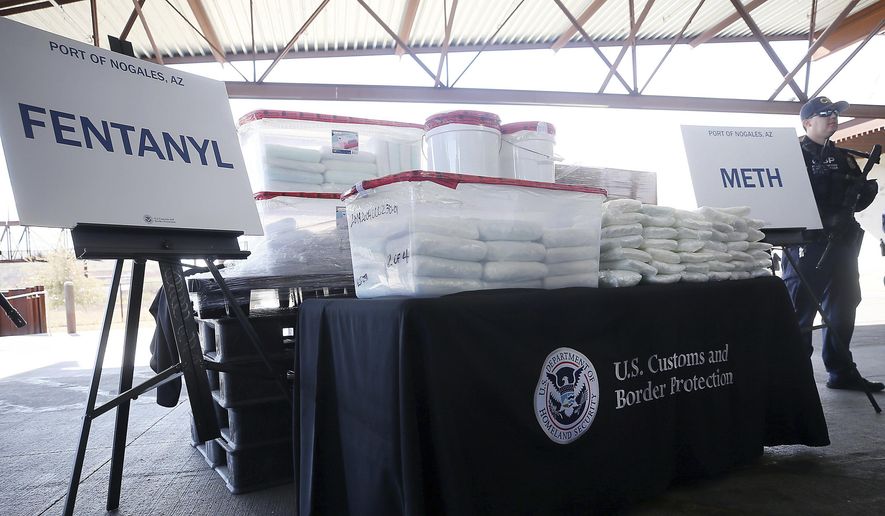OPINION:
Courtney Bannick, a police officer in a small city outside Orlando, Florida, nearly died this week while making a traffic stop that uncovered the presence of illegal substances, including the deadly drug fentanyl.
Ms. Bannick was wearing surgical gloves as she searched the vehicle and found a rolled-up dollar bill containing a powdered substance, according to the Tavares Police Department. As she was handling the contraband, the wind whipped up and blew the powder. She inhaled a small amount of fentanyl.
Soon, she stopped breathing.
Luckily, quick-thinking fellow officers realized Ms. Bannick was in distress and immediately determined what was wrong. They administered naloxone, sold under the brand name Narcan, to reverse the effects of the fentanyl. Her reaction was so severe that it took three doses.
Her partners saved her life.
The headlines from the story were maddening.
“Cop Accidentally Overdoses on Fentanyl.”
No. She did not “accidentally overdose.” She was poisoned. She was nearly murdered. And the people who poisoned her and nearly killed her should be charged accordingly.
The culprits may not have set out Tuesday evening to poison a police officer. But that is what they ended up doing. And they should suffer the consequences and pay dearly for nearly killing her.
Accountability matters.
And so does language.
When the Miami Herald calls this an “accidental overdose,” it shifts the accountability from the criminals and dumps it on Officer Bannick. As if she were trying fentanyl, but accidentally tried too much.
“Accidentally overdose” is what drug users do when they accidentally overdose.
A police officer who is poisoned while carrying out her sworn duties to uphold the Constitution has not accidentally overdosed. She has been poisoned.
Language matters. Especially in politics.
One of the few politicians to understand the importance of accountability and language is former President Donald Trump.
When he announced his first campaign for president back in 2015, he set the political world on fire when he talked about illegal immigration. It had been an obvious and galling problem for many American citizens — including Hispanic voters — for a long time. But politicians in both parties refused to fix the problem.
Particularly enraging for the political set in Washington was the way Mr. Trump talked about illegal immigration.
“When Mexico sends its people, they’re not sending their best,” he said. “They’re sending people that have lots of problems and they’re bringing those problems with them. They’re bringing drugs. They’re bringing crime. They’re rapists.”
And then, hilariously, Mr. Trump said something about how some of them are probably good people, too.
But the important point Mr. Trump was making — the point no politician at that time was smart enough or brave enough to make — is that the government of Mexico had to be held accountable for the invasion of our border.
The second important point that Mr. Trump made — again, one that the vast majority of politicians were terrified to make back then — was that harsh, blunt, clear language was needed to solve this problem that had been festering for nearly 40 years.
Mr. Trump understood that the first step to solving any problem was identifying the problem. Check. The second step is to assign accountability. Check.
The guy had not been off his glass escalator for five minutes and already he had done more to address the illegal immigration crisis than any politician in four decades.
He was smeared, of course, as a racist and ridiculed for his supposedly rudimentary understanding of illegal immigration.
“They’re not all rapists!”
“It’s not Mexico’s fault!”
After Mr. Trump got elected, he kept his promise to fix the problem. Using harsh language and vilifying Mexico, he managed to stem the flow at the border. In fact, one of his most effective techniques was using harsh language to threaten Mexican officials to stop the flow or face harsh sanctions.
Turns out, Mexico had a great deal more accountability than anybody realized.
Mr. Trump’s success at the border while he was in office has never been more obvious than it is today, surveying the wreckage resulting from President Biden’s reversal of Mr. Trump’s border policies.
The invasion has reached historic proportions and promises to only get worse. And it’s not just criminals and rapists they’re sending these days. It’s also fentanyl.
Just ask Officer Courtney Bannick.
• Charles Hurt is the opinion editor for The Washington Times.




Please read our comment policy before commenting.